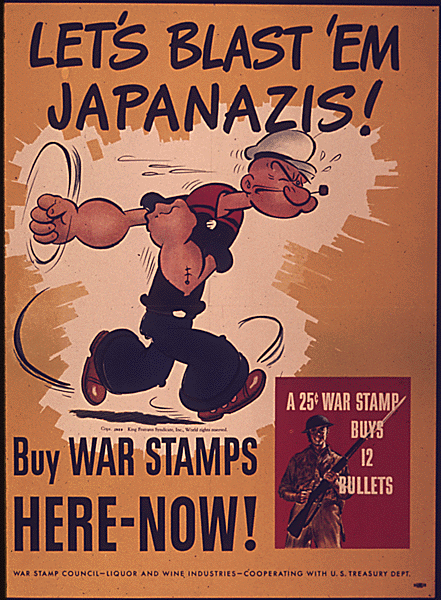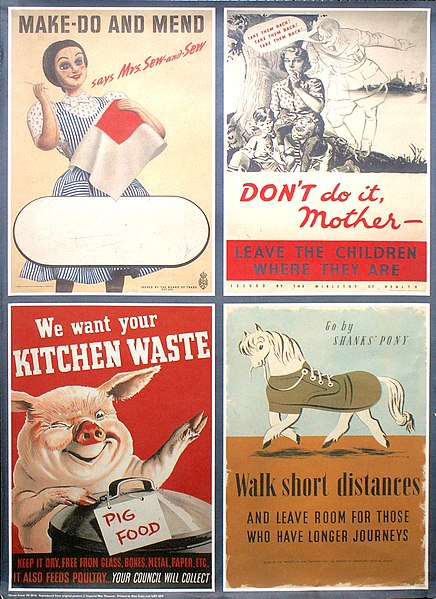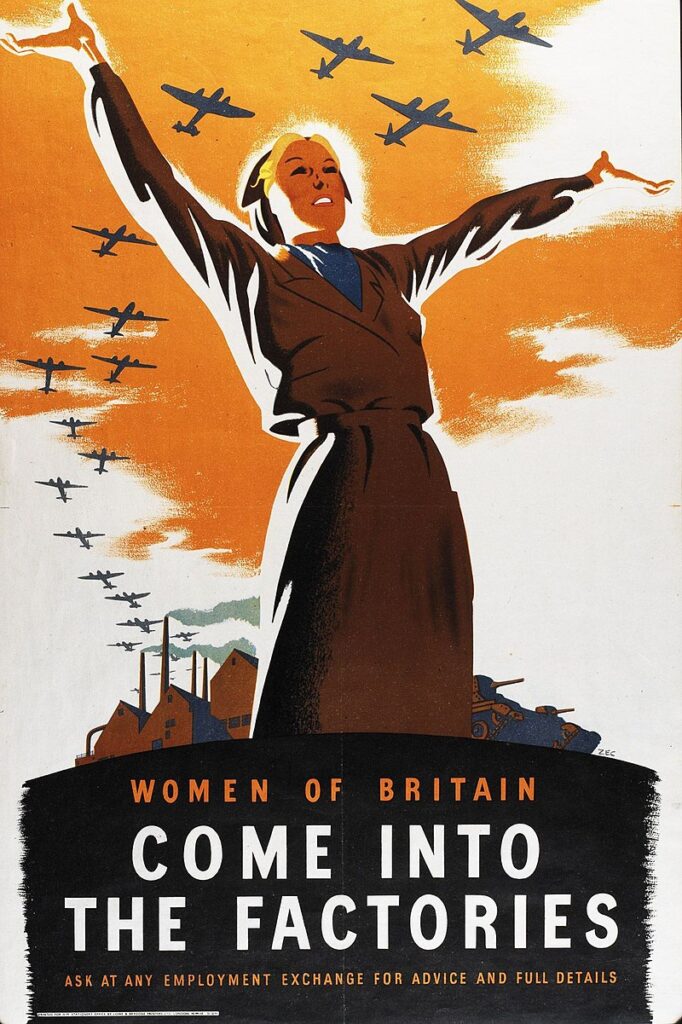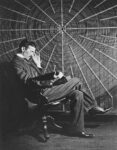Sefton Delmer was a writer who created “Black Propaganda” on behalf of the British government, and used “fake news” to fight the Nazi regime. Through postcards, court documents, and pirate radio programs, Delmer and the rest of the secret service infiltrated the minds of the German people, using elements of violence, sex, and death in their stories to subtlety break down the morale of the Nazis. So, who was Sefton Delmer? And why was he most likely the only man on Earth who could have become the true master of Black Propaganda?

12. February – 16. February 1958: Photographer: Steiner, Egon: License: https://creativecommons.org/licenses/by-sa/3.0/de/deed.en
Early Life and Career
Denis Sefton Delmer was born in 1904 in Berlin, Germany. As a child, everyone called him “Tom”, but as an adult, everyone remembered him by his parent’s conjoined last names, and he was known as “Sefton Delmer”. His father, Frederick Sefton Delmer, taught English at Berlin University. His parents were both from Australia, and they had Jewish heritage. They registered his birth at the British Consulate, so that he could be a dual citizen. He only spoke German before the age of 5, which is parents chose to do on purpose, hoping he would blend in better. He grew up to become bilingual in both English and German, but his parents still raised him to understand his Australian ancestry at home.
At the start of World War I, his Father Frederick was removed from his position as a professor at the university, because he was a so-called “enemy alien”, and he was forced to live at the Ruhleben Internment Camp. Growing up in Germany, the other children in school labeled him as an enemy, and he was isolated from his peers and bullied for being different, even though they were exactly the same.
In 1917, Frederick was released from the camp through a prisoner exchange program between the British and the Germans, but instead of going back to Australia, the whole family was deported to England. So, Sefton Delmer was able to transfer to a school in London. Since German was his first language, he couldn’t help but speak with an accent. As far as his English classmates were concerned, he was considered the “enemy” once again, and he was also isolated from the other children in school.
Even though this must have been difficult, this life of being stuck in-between two worlds is precisely why he was able to understand both cultures so completely. Since he was ostracized for the sound of his voice, or the words he used, it only made him pay attention to those details more, and it would all come in handy later on in his adult life.
World War I ended in 1918, when Sefton Delmer was 14 years old. Despite the fact that he had endured so much bullying in his younger years, he still embraced the fact that he was bilingual. He went on to study Oxford University, where he studied German, possibly to follow in his father’s footsteps of securing a job as a professor. However, he never did start a teaching career. He was able to fully embrace the other passion in his life, writing. And this was just the beginning of his destiny.
Life Before the War
After graduating from Oxford University, Sefton Delmer got a job for a magazine called The Daily Express. Since he was bilingual, he became very valuable to the magazine in translating the news coming out of Germany, in order to make the British public aware. He was able to become friendly with the Nazi officer Ernst Rohm, who introduced him to Adolf Hitler in 1932.
At this time, Hitler had actually lost his first election, and he would not become Chancellor of Germany until 1933. Sefton Delmer was able to travel with Hitler on his private plane, and listen to all of his plans for what he wanted for Germany. He became the first British journalist to ever secure an interview with Adolf Hitler, and he traveled to Berlin to report the day when he took office in 1933. This may seem like a monumental event that should have set him off right then and there, but at the time, no one would ever predict that Hitler would become an evil dictator. He was promising to bring Germany out of the financial hardships it had endured after World War I. and he was even given the title of “Man of the Year” in Time Magazine. So, as far as The Daily Express was concerned, there were far more important things to focus on.
That same year, The Daily Express sent him to France to work out of their offices in Paris. At that time, Paris was the place to be for some of the most creative people in history. Some of the most famous writers of that time were all living and working there in the late 1920’s to early 1930’s, and many of them were actually friends with one another, as well. These writers were apart of the so-called “lost generation”, and they indulged heavily in drugs, sex, and jazz.
While in Paris, Sefton Delmer met and fell in love with a woman named Isabel Nicholas. She was a very successful artist, designer, and model. She was quite beautiful, and she became the muse for several famous painters and sculptors, including Pablo Picasso. In a lot of ways, they were a perfect match for one another, and in 1935, the two were married.
A couple years later, Sefton Delmer became a correspondent during the Spanish Civil War, which lasted from 1936 to 1939. General Francisco Franco was trying to take over the Spanish government on behalf of Fascism, and both Nazi Germany and Italy were sending money and ammunition to Franco’s army.
Sefton Delmer became good friends with Ernest Hemingway, who was there writing the script and did the voiceover for a documentary called The Spanish Earth. Another writer, Martha Gellhorn, was also there for Collier’s Magazine. She was one of the only female war correspondents. She was also willing to put her life in danger to get the scoop on a story. She would later get married to Hemingway, making her his third wife. A large group of these writers, photographers, and filmmakers lived together in the Hotel Florida in Madrid, and they were often singing and drinking in the hotel lobby and bar. They all believed that by covering the events of the Spanish Civil War, they could shed light on the fact that Adolf Hitler was already pushing his Fascist regime on the rest of the world, and that the Nazis were dangerous. But these writers would have no idea that soon enough, their own countries would be at war as well, and there was nothing they could do to stop it.
Black Propaganda
On the brink of World War II, secret agents and spies were commonplace throughout Europe. Her Majesty’s Secret Service was paying close attention to anyone they believed could be a Nazi sympathizer, including Sefton Delmer. It was like he was living through his elementary school experience again, because the Germans believed that he was an agent for MI6, and they no longer allowed him to interview Adolf Hitler or any other high-ranking member of the Nazi party.

It was only after he returned to London and started working for the German branch of the BBC that the British government knew they could actually trust him. Sefton Delmer once described one of Adolf Hitler’s speeches as coming from his “lying, stinking teeth”. While that’s not exactly the most professional thing a journalist can say on the air, it actually worked out really well for him, because in 1940, he was recruited by the Political Warfare Executive branch, or the PWE’s for short.
At that time, the British secret service was very concerned about a pirate radio program called “Worker’s Challenge” was broadcasting from inside of the UK, but it was actually a German propaganda show run by talented actors who spoke fluent English. They were posing as an anti-war program, and they spread fake news to bring down the morale of the British troops.
The British government asked Delmer to make his own version of a radio show that was “Black Propaganda”. The goal was to give out roughly 80% real facts, but try to slip in 20% fake news that was meant to subvert the Germans. He wholeheartedly agreed to do the job, and his wife, Isabel, was excited to help in whatever way she could, as well. In 1941, the government gave him a requisitioned country house in Bedfordshire, where he worked together with a team on creating propaganda. Isabel illustrated fake postcards of German soldiers with French prostitutes. This was meant to make French men angry and jealous, and inherently dislike the Nazis. At that time, Isabel’s illustrations were sexy and suggestive, but far from being pornorgraphic.
Sefton Delmer started a radio broadcast, and he wrote scripts under the alias of “Der Chef”. He hired a German immigrant and actor named Paul Saunders to be the voice of the character. He spoke with a perfect Berlin accent, and they had a strong enough radio tower to make it seem as if the show was being broadcast from Germany. Der Chef claimed to be a loyal Nazi, and that he was simply giving insider information to inform his fellow comrades. He used coarse language, and spoke out against the enemies of the Third Reich. Since Delmer grew up in Germany, he knew how to write like these words were truly coming from a German person, and no one would have ever known that the show was actually produced by the English.
Sefton Delmer had a great sense of humor, and he knew how to capture an audience’s attention. Much of the fake news he wrote included sexual stories, which was enough to keep the audience listening on a regular basis. For example, he once wrote that the British were trying to get German prisoners of war to give up their secrets by tying them up and “torturing” them with strippers. Der Chef urged them to be strong, and not give in to temptation. Saunders would have to tell these stories as if he was outraged at the English, saying, “Don’t give in to these perversions! Say nothing!” Then, once he had their attention, he would go on to tell fake news that was secretly meant to demoralize the enemy.
Sefton Delmer was also a part of the government’s “Underground Propaganda Committee”. It was their job to collect rumors that were already spreading in German communities, and used those as the basis of their fake news. By using this strategy, they were simply confirming what people were already whispering about, so it was far easier to the audience to believe that it was true.
Along with the “Der Chef” show, Sefton Delmer wrote and produced a second radio program called “Atlantic Sender”, which was meant to seduce German soldiers. They played jazz music, which had been forbidden to German citizens. A female actress named ç, who they called “Vicky”, read the scripts in her sultry voice. Together with another writer and spy, Ian Fleming, Delmer put together stories that were basically erotic fan fiction of various fantasy scenarios between German men and English women.
These stories worked exactly as he had hoped they would. A former German officer named Horst Bredo said that he would listen to “Atlantic Sender” with the rest of the men who were stationed in a U-Boat. Once he saw the photographs of how truly beautiful the actress was, he asked for a copy of photos, and joked, “If there were TV’s on board the U-Boat, and we saw these pictures, a lot of them would say, ‘The war is finished. Let’s go home and be with English girls.’”
Of course, not everyone was a fan of these sexy stories. A politician named Sir Stafford Cripps got ahold of an English translation of the Der Chef broadcast. The particular script he read was a dirty story about an orgie, and Cripps was disgusted by how crude they were. He wrote, “If this is how we win the war, I’d rather lose it.” Despite receiving this criticism, the show was able to continue. The Black Propaganda team had really figured out what made men tick, and their subversive messages manipulating me through their sexual desires and fantasies was actually working.
Years later, after the war was won, Delmer’s co-writer, Ian Fleming, had a lightbulb moment. If the German soldiers would go crazy fantasizing over these characters, so would the rest of the men in the world. He continue to write these sexy stories, only this time, the main character was a British spy, whose adventures were based on his own experiences during the war. He wrote pulp fiction novels about his alter-ego, James Bond.
Delmer’s wife, Isabel, would later say that they were both having the time of their lives creating this propaganda. She thought it was hilarious that the government was essentially paying her to draw pornography for a living. They recruited some of the most talented artists in the country to join the team, and Sefton Delmer had his own sense of humor for initiating new recruits.

A 22-year old artist named Marion Whitehorn was asked to join the secret organization. There were several British generals there the day of her briefing. They were all wearing their uniforms, without even a hint of a smile on their faces. Delmer said that if she told anyone about the secret mission they were about to give her, she would be sent to jail, and suffer 10 years of hard labor. She nervously agreed, and he slid a postcard of Adolf Hitler across the table. The postcard was titled with the German phrase; “What we have, we hold”. Her first assignment was to tamper the postcard to make it look as though Hitler was holding his own penis in his hand.
Decades later, Marion Whitehorn told this story during an interview for a documentary. She said, looking back, she could have laughed, but the atmosphere of the room was so serious, she simply agreed to do the duty for her country. As she left the room to get started, Sefton Delmer called out, “But not too big, Marion!”
Meanwhile, in Germany, the Nazi Minister of Propaganda, Joseph Goebbels, had an entirely different strategy all together. Instead of using subtle and creative writing, he was loud, and confidently stated bold lies about how the Jews were to blame for Germany’s hardships. For a population of people who were desperate, they clung on to the idea that they could blame the Jews for the economic problems of Germany. As time went on, it became clear to Sefton Delmer and his team that writing subtle jokes and sexy stories were not going to be enough to win the war. So, they had to get darker.
Delmer’s team was able to find the exact typeface used in official German documents. This way, they created fake court records, and “leaked” them to the public. All of these fictional court cases were made to have the S.S. Officers guilty of rape and murder. He wrote excruciating details of the story, only to have them acquitted of all charges by the end. This was obviously meant to outrage anyone who read the documents, and it made the Nazi government look like complete monsters. He wrote these to try to convince German people that they were fighting for an evil, corrupt government.
In 1943, he decided that he wanted to stop the “Der Chef” broadcast, but he knew that his character would never actually stop his radio broadcast, unless he was forced to. So he wrote and staged a scene where Nazi soldiers came through the door to his studio, and shot him while he was live on air. He hoped that if Nazi soldiers were out there listening, they would realize that there was no such thing as freedom of the press in a Fascist government.
Psychological Warfare
The longer the war went on, the higher the stakes became. They felt that it was necessary to mess with the the minds of German men in the darkest ways. A lot of the information that was given to the Black Propaganda writers came directly from highly skilled British Intelligence agents who were interrogating captured Nazi soldiers. Whenever a Nazi soldier refused to say anything about his top-secret information, they would try to get him to relax and talk about his personal life, instead. Without realizing it, these soldiers were giving up information about the bases where they were staying, the bars where German soldiers drank, and so on. So, since those names and details given out about these men on the radio were accurate, they believed there must be a spy among them who was giving away all of their information. This made the Germans distrust one another, and it was difficult for them to form a close bond with their comrades.

They would read out the names of streets that had been apparently bombed in Berlin and Hamburg, even if they hadn’t. They purposely figured out where German U-Bombers lived, so that they could read out the specific addresses of all of the men who were on the boats. This would make the soldiers fall into a state of depression and anxiety, and completely ruin their morale. Many of those German soldiers would go through the rest of the war feeling like they had nothing to fight for. The British also dropped photographs of dead women and children over German bases, which made them wonder if their own wives and children were among the dead.
Many of these men would be in the shock of their lives to go home to find out that their family was actually still alive.
The Germans chose to do the same sort of propaganda, only with the strategy to make the Allied soldiers want to end the war and go home. They played on men’s jealousies, with a sultry female voice playing over the radio, asking if they knew what their wives and girlfriends were doing without them. By the time Americans joined the war, German planes were dropping leaflets of fake “Life” magazines featuring photographs of nude women on one side, and “Death” with a skull wearing a helmet on the other. There was also one leaflet that said “Gentlemen prefer blondes, but blondes don’t like cripples”- with a picture of an American veteran amputee.

All of these dark campaigns lead to Sefton Delmer’s most heartless project yet, called “The Dead Letters”. British Intelligence was able to intercept letters written to German soldiers who had actually died. Many of them were from concerned mothers, saying that they had not heard from their sons in a while, and hoped they were safe. If British Intelligence managed to intercept those letters, Delmer would write back to these families, claiming that these men were in hiding, and would be home soon. At first, this sounds like he actually being kind to these German families. But after reading enough of these letters over the radio, German soldiers who heard the broadcasts would hear the names of the men they saw dying in front of their eyes. They knew that someone was lying, and they believed that the Dead Letters were coming from the German government.
During these dark times, Sefton Delmer’s wife, Isabel, could not take it any longer. She resented Delmer for how cruel he was being to his fellow human beings. War or not, this propaganda wasn’t funny anymore. She couldn’t handle having any part in it. They ended up getting a divorce. The war had left its scars, and Isabel would go through two more marriages before the end of her life.
After World War II was over, Sefton Delmer returned to his job at the Daily Express. He published a novel called Black Boomerang in 1962, but beyond that, he lived out a quiet retirement. Sworn to secrecy, he never fully revealed the details of his time creating Black Propaganda, until the 1970’s, when enough time had passed, and he was allowed to finally talk about his experiences in his autobiography, The Counterfeit Spy.

Today, few people remember Sefton Delmer, or how he was a voice of opposition for the German people, who were used to hearing the loud lies of Adolf Hitler and Joseph Goebbels. While we will never know just how many people heard his broadcasts, we do know that his work was one of the many elements that helped the Allies win the war.
Sources:
https://www.nytimes.com/1979/09/07/archives/sefton-delmer-reporter-witnessed-hitlers-rise.html
https://www.nytimes.com/2008/02/10/theater/10mcgr.html
https://www.psywar.org/seftondelmer
https://www.youtube.com/watch?v=BxaV-vOdDSw
http://www.psywarrior.com/AxisLeadersMonsters.html
Secondary Sources:



